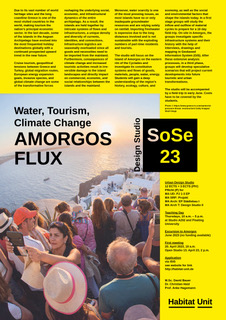Design Studio SoSe 2023
Dr. Christian Haid, David Bauer, Prof. Anke Hagemann
Amorgos Flux
Water, Tourism, Climate Change
Due to its vast number of world heritage sites and the long coastline Greece is one of the most visited countries in the world, making tourism the nation’s principal economic sector. In the last decade, some of the islands in the Aegean Archipelago have evolved into the most frequented holiday destinations globally. Their blue waters and romantic harbor towns, the islands' warm, dry Mediterranean climate and relatively exclusive tourism have brought thousands of guests from around the world, with a continued prospected upward trend in the near future.

Many of the arid islands have evolved into urbanized tourist destinations influenced by global and national economic and political developments that transformed these regions in unprecedented ways, reshaping the underlying social, economic, and infrastructural dynamics of the entire archipelago. As a result, the islands are held together by intricate systems of flows and infrastructures, a unique density and diversity of currents, identities, and connections.
Cruise tourism, geopolitical tensions between Greece and Turkey, global migration routes, European energy expansion goals, invasive species, and global climate change are some of the transformative forces shaping the region with significant ecological and social consequences.
Infrastructure logistics are seasonally overloaded since all goods and necessities need to be imported from the mainland. Furthermore, consequences of climate change and increased touristic activities result in irreversible damage to the island landscapes and directly impact on commercial, economic, and social relationships between the islands and the mainland. Moreover, water scarcity is one of the most pressing issues, as most islands have no or only inadequate groundwater resources and are relying solely on rainfall. Importing freshwater is expensive due to the long distances involved and is not sustainable with the exploding numbers of part-time residents and tourists.
The studio will focus on the island of Amorgos on the eastern rim of the Cyclades and investigate its constitutive systems and flows of goods, materials, people, water, energy. Students will gain a deep understanding of the region's history, ecology, culture, and economy, as well as the social and environmental factors that shape the islands today. In a first stage groups will study the inflow and outflow of material cycles to prepare for a 10 day field-trip. On site in Amorgos, the groups investigate specific infrastructure systems and their history with the help of interviews, drawings and mapping in Geobased Information System (GIS). After these extensive analysis processes, in a third phase, groups will develop speculative scenarios that will project current developments into future touristic and urban transformations.
The studio will be accompanied by a field-trip in early June. Costs have to be covered by the students.
Photo ©
Download Poster here.
Design Studio
12 ECTS + 3 ECTS (PIV)
MA UD: PJ 1-3 EP
M Arch: EP Städtebau I/II
MA Arch T: PJ 1-3
MA SRP: Projekt
Teaching Day
Thursdays 10am to 5pm, IfA and Floating University
Studio A202
Open Studio
April 13, 2023, 2 pm, Room 202
First meeting
April 20, 2023, 10 pm, Room 202
Excursion to Amorgos
June 2023 (no funding available)
Application
tba
Betreuung
Dr. Christian Haid
David Bauer
Prof. Anke Hagemann
David Bauer
bauer@tu-berlin.de
Dr. Christian Haid
c.haid@tu-berlin.de
Download Studio Introduction Presentation here.